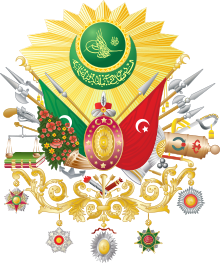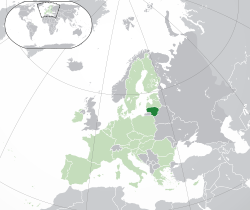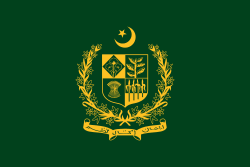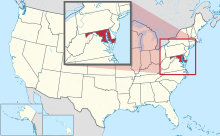Portal:Politics
| Main | Topics and categories | Tasks and projects |
The Politics portal
Politics (from Ancient Greek πολιτικά (politiká) 'affairs of the cities') is the set of activities that are associated with making decisions in groups, or other forms of power relations among individuals, such as the distribution of resources or status. The branch of social science that studies politics and government is referred to as political science.
It may be used positively in the context of a "political solution" which is compromising and non-violent, or descriptively as "the art or science of government", but also often carries a negative connotation. The concept has been defined in various ways, and different approaches have fundamentally differing views on whether it should be used extensively or in a limited way, empirically or normatively, and on whether conflict or co-operation is more essential to it.
A variety of methods are deployed in politics, which include promoting one's own political views among people, negotiation with other political subjects, making laws, and exercising internal and external force, including warfare against adversaries. Politics is exercised on a wide range of social levels, from clans and tribes of traditional societies, through modern local governments, companies and institutions up to sovereign states, to the international level.
In modern nation states, people often form political parties to represent their ideas. Members of a party often agree to take the same position on many issues and agree to support the same changes to law and the same leaders. An election is usually a competition between different parties.
A political system is a framework which defines acceptable political methods within a society. The history of political thought can be traced back to early antiquity, with seminal works such as Plato's Republic, Aristotle's Politics, Confucius's political manuscripts and Chanakya's Arthashastra. (Full article...)
Selected article
The Convention of 1832 was the first political gathering of colonists in Mexican Texas. Delegates sought reforms from the Mexican government and hoped to quell the widespread belief that settlers in Texas wished to secede from Mexico. The convention was the first of a series of unsuccessful attempts at political negotiation that eventually led to the Texas Revolution. On October 1, 1832, 55 political delegates met at San Felipe de Austin to petition for changes in the governance of Texas. Notably absent was any representation from San Antonio de Béxar, where many of the native Mexican settlers (Tejanos) lived. The delegates elected Stephen F. Austin (pictured), a highly respected immigrant, as president of the convention. Delegates passed a series of resolutions requesting, among other things, a repeal of the immigration restrictions, a three-year exclusion from custom duties enforcement, permission to form an armed militia and independent statehood. They also voted themselves the power to call future conventions. Before the petition could be delivered to Mexico City, the political chief of Texas, Ramón Músquiz, ruled that the convention was illegal and annulled the resolutions. In a compromise, the ayuntamiento (city council) of San Antonio de Béxar drafted a new petition with similar language to the convention resolutions and submitted it through proper legal channels. Músquiz forwarded the new document to the Mexican Congress. (more...)
Featured picture

David Ben-Gurion (born David Grün; 16 October 1886 – 1 December 1973) was the primary national founder of the State of Israel and the first Prime Minister of Israel. Adopting the name of Ben-Gurion in 1909, he rose to become the preeminent leader of the Jewish community in British-ruled Mandatory Palestine from 1935 until the establishment of the State of Israel in 1948, which he led until 1963 with a short break in 1954–55.
Selected quote
Selected biography
Józef Piłsudski (1867–1935) was Chief of State (1918–22), "First Marshal", and authoritarian leader of the Second Polish Republic. From mid-World War I he was a major influence in Poland's politics, and an important figure on the European political scene. He is considered largely responsible for Poland regaining independence in 1918, after 123 years of partitions. Early in his political career, Piłsudski became a leader of the Polish Socialist Party. Concluding, however, that Poland's independence would have to be won by force of arms, he created the Polish Legions. In 1914 he anticipated the outbreak of a European war, the Russian Empire's defeat by the Central Powers, and the Central Powers' defeat by the western powers. When World War I broke out, he and his Legions fought alongside the Austro-Hungarian and German Empires to ensure Russia's defeat. In 1917, with Russia faring badly in the war, he withdrew his support from the Central Powers. From November 1918, when Poland regained independence, until 1922, Piłsudski was Poland's Chief of State. In 1919–21 he commanded Poland's forces in the Polish–Soviet War. In 1923, with the Polish government dominated by his opponents, particularly the National Democrats, he withdrew from active politics. Three years later he returned to power with the May 1926 coup d'état, and became the de facto dictator of Poland. From then until his death in 1935, he concerned himself primarily with military and foreign policy.
Did you know (auto-generated) -

- ... that John Henry Dunn resigned from the Executive Council of Upper Canada only three weeks after his appointment, throwing away a post he had sought for 16 years, on a matter of political principle?
- ... that Nirmalendu Goon shared his doubts about Sheikh Mujibur Rahman's political decisions during the 1969 East Pakistan mass uprising in his poem Huliya?
- ... that Crossing a Line compares Palestinian political expression on either side of the Green Line between Israel and the occupied Palestinian territories?
- ... that advertisements for Road 96 were taken down by Facebook for being too political?
- ... that Aymara legislator Rafael Quispe's humorous style of political activism led one Bolivian parliamentarian to describe him as the "Chapulín Colorado" of the Legislative Assembly?
- ... that although he was a former Indonesian prime minister, Soekiman Wirjosandjojo was not arrested during a political purge as he was considered a non-threat?
More did you know...
- ...that the first phase of Mitt Romney's 2012 U.S. presidential campaign was announced via a video message?
- ...that politicians discuss the ways in which they and their families have suffered because of Oprahization?
- ...that Democratic and Republican plans for the 2012 United States federal budget both focus on deficit reduction, but differ in their changes to taxation, entitlement programs, and research funding?
- ...that Conservative Party candidate Bernard Trottier won a seat in the 41st Canadian Parliament by defeating the incumbent Leader of the Liberal Party of Canada in the 2011 federal election?
- ...that Chinese Taipei is the designated name the Republic of China (Taiwan) uses in most international organizations?
- ...that Roman embassies to China are reported in Chinese historical accounts from as early as 166?
In this month
- May 5, 2005 – A General Election in the United Kingdom sees Tony Blair's Labour government returned to office with a reduced majority of 66.
- May 14, 1948 – The Declaration of Independence of Israel is made.
- May 18, 1948 – The first Legislative Yuan of the Republic of China officially convenes in Nanking.
News and Current events
- August 11: 4 local government areas in New South Wales, Australia locked down after COVID-19 case
- August 11: Australia: AstraZeneca vaccine access expanded by Victorian government
- August 1: Australia: Victorian lockdown lifted
- July 29: Tunisia's president dismisses prime minister, suspends parliament
- July 25: Australia: Wikinews interviews Reg Kidd, mayor of the City of Orange, about COVID-19 lockdown and local government
- July 23: South Australia enters week-long lockdown to contain COVID-19 Delta variant spread
- July 21: Technological University Dublin senior lecturer Dr Lorcan Sirr speaks to Wikinews on housing market in Ireland
- July 21: Three rural councils in New South Wales, Australia enter 7-day lockdown
- July 21: Australia: Victoria lockdown extended by a week with 85 active cases recorded
- July 15: California governor signs new state budget, eligible Californians to get stimulus payments
Topics and categories
General images
Related portals
Associated Wikimedia
The following Wikimedia Foundation sister projects provide more on this subject:
-
Commons
Free media repository -
Wikibooks
Free textbooks and manuals -
Wikidata
Free knowledge base -
Wikinews
Free-content news -
Wikiquote
Collection of quotations -
Wikisource
Free-content library -
Wikiversity
Free learning tools -
Wiktionary
Dictionary and thesaurus





























































